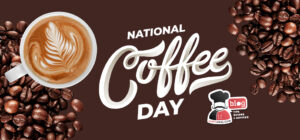By Sharon Schweitzer and Polina Anastassieva
Second only to oil, coffee is the most valuable legally traded commodity in the world. We love it, we rely on it, and we drink it in massive quantities. It is estimated that 2.25 billion cups of coffee are consumed each day worldwide. New Yorkers are said to drink 7 times the amount of any other U.S. city, which is why it may seem like there is a Starbucks on every corner of Manhattan.
U.S. Americans love coffee, and on September 29th, we celebrate National Coffee Day.
While coffee beans are thought to have originated in Ethiopia and were first cultivated across the red sea into Yemen in the 15th Century. It then started to be grown here in the Yemeni district of Arabia, and by the 16th century it was known in Persia, Egypt, Syria, and Turkey.
It was known as the “wine of Araby.” The beverage started to become a little too popular as coffee houses started to open up all around Arabia. These coffee houses were known as “Schools of the Wise.”
However, in the early 1500’s, the court at Mecca declared coffee to be forbidden due to its stimulating effect. A similar thing happened in both Cairo, Egypt and in Ethiopia.
All of these bans were eventually lifted, but coffee faced its fair share of persecution before that.
According to NCA (National Coffee Association), 7 in 10 Americans drink coffee every week; 62% drink coffee every day. The average American coffee drinker drinks just over 3 cups per day. Nine out of ten older coffee drinkers consume a cup at breakfast, compared to seven out of ten 18-24 year-olds do. Young people are almost twice as likely to consume a coffee beverage at lunchtime than someone over 60.
In fact, coffee availability in the office matters. Business Insider insists that splurging on office coffee is a ‘must’ for businesses.
Here’s why your business might need to ‘up’ its workplace coffee game:
Healthy Employees: A cup of java can do great things for the body, including reducing the risk of type 2 diabetes, Parkinson’s disease, dementia, stroke, and certain types of cancers. Should we change the age-old saying to: A coffee a day keeps the doctor away?
Quality is the New Quantity: The National Coffee Association’s 67th National Coffee Drinking Trends Report shows that of late, overall coffee consumption by U.S. Americans has decreased slightly (2%), but the market share for espresso-based coffee drinks has risen. Many attribute this trend to Millennials, who are spending more on coffee drinks than previous generations. As Millennials continue making up a larger fraction of the workforce, the availability of gourmet espresso drinks at work might foster a happier team.
Benevolent Brewing: Concurrent with the trend of spending more on a cup of coffee is the Fair Trade coffee trend. Caffeine lovers are increasingly concerned with how their spent dollars affect people at all levels of the supply chain. Globalization of the coffee market put farmers in coffee-exporting countries at risk of unfair compensation. As a result, Fair Trade certifications, which aim to ensure ethical compensation of agricultural workers, have been on the rise. This type of socially-conscious consumerism makes coffee drinkers feel good. Offering Fair Trade Coffee in the workplace may boost moods office wide for reasons besides the caffeine.
A Caffeinated Work Environment is a Good Work Environment: Not only does coffee increase productivity by blocking receptors in the brain that make us feel sleepy, it also carries social benefits by fostering a collaborative community gathered around caffeine and by boosting moods.
In short, offering quality coffee at work can result in healthier, happier, and more productive employees. On the 29th, partake in the nationwide celebration by posting a photo of your java, mocha, cappuccino, French press, cold brew, double espresso shot, or a mug of classic drip coffee on social media with #NationalCoffeeDay in your caption.
Photo By Chef’s Deal Restaurant
Sharon Schweitzer JD, is a diversity and inclusion consultant, cross-cultural trainer, etiquette expert, and the founder of Access to Culture. In addition to her accreditation in intercultural management from the HOFSTEDE Centre, she is an attorney and mediator. Sharon served as a Chinese Ceremonial Dining Etiquette Specialist in the documentary series Confucius was a Foodie, on Nat Geo People. Her Amazon #1 Best Selling book in International Business, Access to Asia: Your Multicultural Business Guide, won a coveted Kirkus Star, and was named to Kirkus Reviews’ Best Books. She’s a winner of numerous awards, including the British Airways International Trade Award at the Greater Austin Business Awards.
Polina Anastassieva, is a compliance, fraud prevention and detection, and risk management analyst, as well as an international business consultant. Polina is also an entrepreneur and a writer, her blog, specifically focuses on understanding international topics such as trade, culture, foreign affairs, and conducting business around the globe. She has also been featured on St. Edward’s University‘s alumni website, as a distinguished member and supporter for the community. Additionally, she is on the board of World Affairs Council of Austin.
#SharonSchweitzer, #AccesstoCulture, Access2Culture, #InternationalCelebration, #AccesstoAsia, #GlobalEtiquette, #Cross-CulturalTrainer, #InterculturalCommunication, #InternationalCommunication, #Interculturalist, #Etiquette, #CultureExpert, #Speaker, #KeynoteSpeaker, #NationalCoffeeeDay, #coffee, #caffeine, #latte, #cappuccino, #espresso, #java, #mocha, #Ethiopia, #Yemen, #Egypt, #Syria, #Turkey, #socialbenefits


Leave A Comment